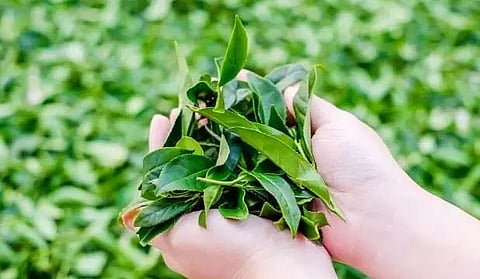
- Home
- Live Blog
- Breaking News
- Top Headlines
- Cities
- NE News
- Sentinel Media
- Sports
- Education
- Jobs

Assam Chief Minister Himanta Biswa Sarma's suggestion to make the proposed Assam Tea Policy broad based, aligning with the requirement of the industry has set the tone for drawing the roadmap that will play a crucial role for its growth and sustainability. The sustainability of the industry is also critical for livelihoods for more than five million population of the state. Enhancing productivity of the large tea gardens and ensuring remunerative price for green leaves for small tea growers are two specific requirements of the comprehensive tea policy for the state. Large tea gardens with 67% of area account for 53% of total tea produced in the state as the productivity is low at 1534 kg/hectare compared to small tea gardens (STG) with 33% of area account for 47% of production due to high productivity of 2705 kg/Ha. The large and small tea gardens together account more than 50% of total tea production in India which is about 12% of global production. Evidently, the STGs are the main drivers of steady production growth but volatility of prices of green tea leaves has pushed many STGs into uncertainty and the effectiveness of the policy will be determined by solution it offers for small tea growers as key stakeholders apart from addressing concerns of large tea gardens. About 120 million kg of the total of about 700 million kgs of tea produced in the state is exported which earns foreign exchange to the tune of Rs 3000 crores. This implies the importance of Assam tea industry for the country and the central government promoting export of tea produced in the state can go a long way not just for the industry in the state also for the country's economy. Creating alternative livelihood opportunities for families dependent on tea industry will be vital for long term sustainability of the industry so that industry. Due to lack of multiple income opportunities, the household income of tea garden workers remains limited. Better education and skill training can enable adult family members other than those engaged in garden works of plucking or as other employees can contribute to household income and improving the lives of tea gardens better. Reduced workforce and technology adoption can contribute to increasing productivity for large tea gardens but ignoring shortage of workers for plucking and other works due to garden workers shifting to alternative livelihood avenues could be counterproductive. The policy must address the issue by fine balancing between garden workers' livelihood protection, their welfare measures and industry's requirements. The industry focussing on adoption of better marketing strategies for huge untapped domestic markets as well as new export markets is equally important for its sustainability. Aggressive marketing and promotion of the brand Assam tea across the country is missing despite the fact it has very good demand and popularity because of its high quality and taste. Such a high quality of Assam tea is ensued by centuries old practice of hand plucking of one bud and two leaves but a section of small tea growers not following the practice is also a key factor behind lack of consensus between bought leaf factories and small growers over the quality of green leaves and pricing. Falling prices and increased wages of workers are huge impediments before long term sustainability of small tea growers, most of whom are first generation entrepreneurs. If the remunerative prices is ensured, increasing wages to help workers overcome inflation pressures will not be an issue for the industry, more particularly for small tea gardens. The policy putting in place a permanent mechanism of standardized practice of plucking so that quality is not compromised by any grower and prices remained remunerative throughout the year to end uncertainties. Assam government has already initiated key welfare measures for garden workers and setting up of model high schools in garden areas is a significant step is ending deprivation of children of tea garden workers from quality education. Lack of quality education was also posing huge obstacle in children of garden workers going for higher studies and acquiring skills for jobs and employment and ended up migrating towns and cities for low-paid menial works. This pushed the families of garden workers to live in perpetual poverty with subsistence income. While the state government has come forwarded to shoulder the burden of welfare for tea garden workers with education and other social support the industry, particularly the large tea estates taking the challenge of increasing productivity with modern farming, quality planting material, adoption of technology is the need of the hour. With connectivity projects pushed by India with neighbouring countries creating new opportunities of trade and commerce for agricultural and horticultural produces in Assam and other north-eastern states, the policy needs to envisage the tea industry in the state to explore the neighbourhood export markets.